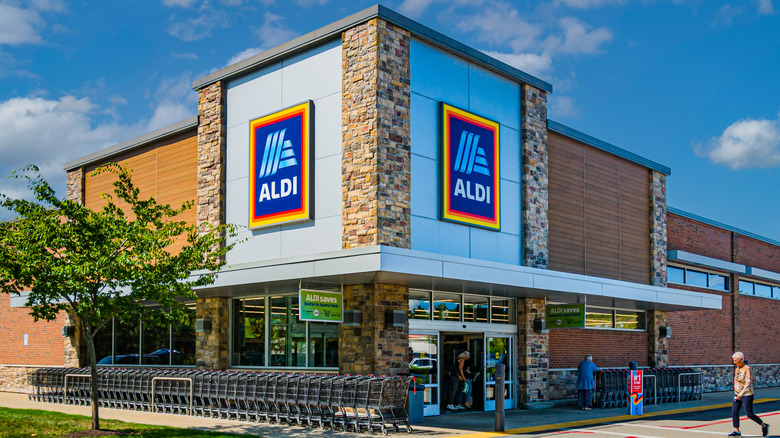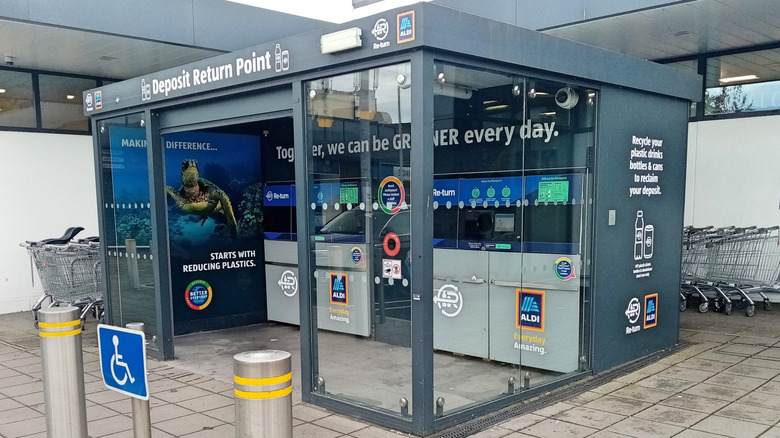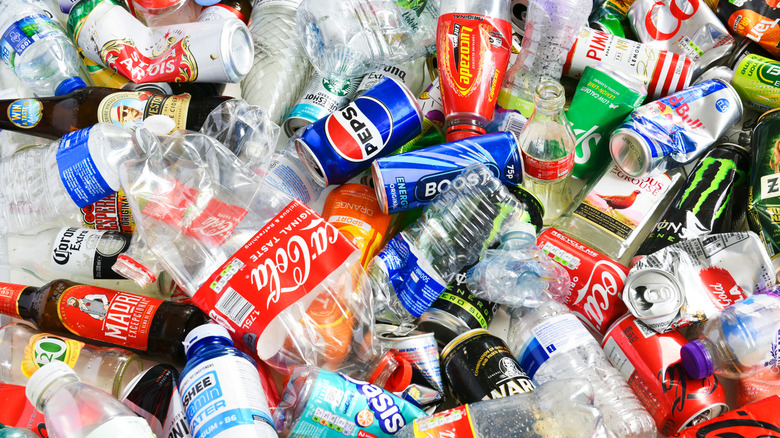This New Aldi Policy Is Putting Money Back In Customer Pockets (And Reducing Waste)
Aldi is always a solid option for shoppers looking for ways to save on groceries while also providing fun and useful items in their frequently-changing center aisles. Aldi shoppers can save big on everything from organic eats to the cheapest pound of ground beef in America. Whether picking up a take-and-bake pizza or a money-saving Aldi kitchen appliance, Aldi is a one-stop shop of frugality-forward wonders. But now, some of Aldi's international outposts are also paying customers back when they choose to recycle onsite.
Aldi Ireland launched a bottle and container recycling program for Ireland's 163 Aldi locations in 2024, after a strong 2022 pilot run in Mitchelstown in County Cork. Aldi installed reverse vending machines (RVMs) at all Ireland locations, allowing shoppers to return cans and bottles for cash or voucher returns. The onsite recycling program has been a smashing success, with shoppers returning 363 million items to stores in the last year, amounting to total customer paybacks of €62 million, or $71 million. The returns can be processed onto a payment card, or shoppers can choose to forward their payback to Barnardos – Aldi Ireland's charity partner benefitting children in need. While the program is a huge success in Ireland, it may be some time before such a broad sweeping program hits Aldi locations in the United States, thanks to a complicated web of legal and political factors that affects recycling options in each state.
Investment in recycling programs may be too complicated for the U.S.
Aldi's investment in the RVMs necessary for the program in Ireland cost around €15 million, or $17 million. While the U.S. has the same need for recycling, cash back, and charity impact assistance as Aldi shoppers in Ireland do, the initial investment required for such a program is unlikely to be as well spent in the States as it was in Ireland. Ireland is a relatively small nation, in terms of both area and population — around 5.3 million. With strong agreement across local leadership and a focus on making a positive impact on the environment, spending millions to generate multiple millions ended up being a good return on investment for Ireland. However, the sheer vastness of the United States — and its 342.7 million people — makes it unlikely that the U.S. could implement such a program with the same precision and success.
With that said, $17 million is a drop in the bucket for most major industries in the U.S., and the number is downright paltry compared to things like the massive settlements that Amazon has had to pay, or even the same kinds of settlements from Meta. Even worse, $17 million is chump change compared to the $380 billion (and counting) being spent by major corporations on Artificial Intelligence investments in 2025. However, the real problem is that when it comes to implementing the bottle bills necessary to create a program like Aldi Ireland — many corporations actively fight against it and are even willing to spend many more millions to stop them altogether.
The U.S. battle over bottle bills
"Bottle bills" (or container deposit laws) are how most deposit return systems are referred to in the U.S. In a state with a bottle bill, shoppers are usually charged a five or 10-cent deposit for all recyclable cans and bottles. The customer can get this deposit back if they recycle the bottle at a deposit center. The point of a bottle bill is to incentivize recycling, and it largely works. States that have bottle bills tend to have high return rates, meaning less bottle and can litter and more money back in a consumers pocket. The problem is that only ten states have bottle bills in 2025.
The fight against bottle bills has long been won by major beverage producers, who do not want to assume the extra costs from single-use plastics. Bottle bills can also complicate some tax-funded clean up programs, which can complicate political relationships and state budgets. While some states have recently expanded their existing recycling programs to include canned wine, Hawaii was the last state to start a bottle bill — back in 2002.
While there are certainly many clever tricks to save money at Aldi, recycling bottles may not be one of them — at least for shoppers in most U.S. states. However, Aldi is planning on adding 800 new stores by 2028, bringing its grand total to 3,200 U.S. locations. This $9 billion investment could mean Aldi will someday have the power to introduce container deposit laws to more states.


